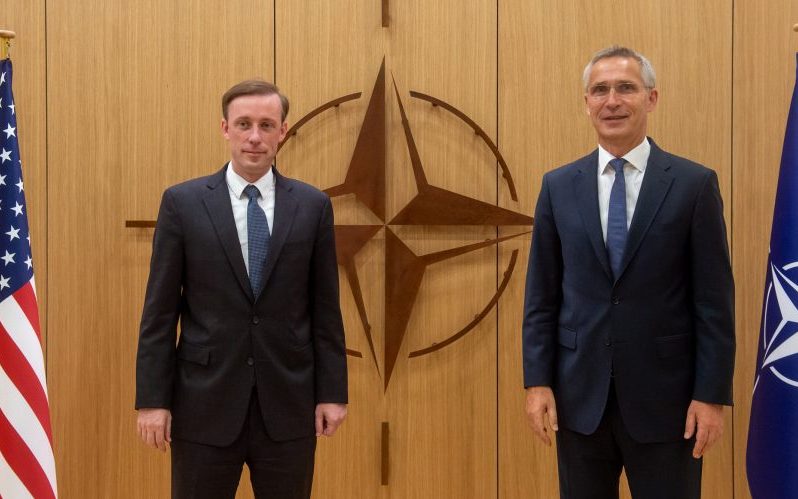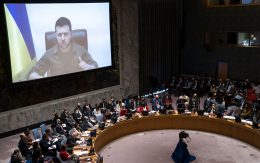Whenever national security is brought up in public discourse, it is commonly thought of and discussed in stricter terms. Images of military personnel performing combat operations, government-sponsored hackers performing network intrusions, or hypersonic missile launches are among the first images. However, these are only part of the entire national security threats posing nation-states around the globe. Non-traditional security threats pose a real and serious challenge to the Intelligence Community and the U.S. national security strategy as a whole.
Non-traditional security threats are defined as being “…stateless, born out of a symbiosis of systemic factors. They are transnational, whereby their effects spill over borders, even if their causes may be localized. Finally and crucially, they have non-military origin”. All too often little attention is paid to more non-traditional or human security matters, such as energy crises, water shortages, and viruses like AIDS. Like many other countries, non-traditional national security threats are multiple and can come in a variety of forms, with “Climate change, irregular migration, transnational crime and human trafficking, resource scarcity, and even corruption [fitting] the bill”. The COVID-19 coronavirus pandemic affecting the entire globe is a prime example of a non-traditional national security threat.
With COVID-19, it is apparent that the current national security strategy of the United States is somewhat lacking. This is not to say that the strategies did not mention non-traditional threats as they do; the December 2017 National Security Strategy briefly mentions pandemics writing that these biological threats pose a real threat to the homeland and can result in, “taking lives, generating economic losses, and contributing to a loss of confidence in government institutions,” while predominantly noting that these biological threats can be utilized by enemy nations and non-state actors.
The ODNI’s January 2019 Worldwide Threat Assessment provides a more expanded view of how these biological threats can be an extreme danger, with the section on Human Security first discussing global health. The assessment explicitly states too, “although the international community has made tenuous improvements to global health security, these gains may be inadequate to address the challenge of what we anticipate will be more frequent outbreaks of infectious diseases because of rapid unplanned urbanization, prolonged humanitarian crises, human incursion into previously unsettled land, expansion of international travel and trade, and regional climate change” acknowledging that while strides have been made, a more adequate defense is required.
Overall, the Intelligence Community’s assessment is a far more suitable one in terms of tactics, defenses, and recommendations than the more formal National Security Strategy.
Despite these official, formal policy goals outlined years prior, the U.S. was still severely unprepared to deal with a pandemic. However, I do not fault the Intelligence Community nor the overall national defense/security framework for these lapses; I find fault with the civilian, appointed authorities. It is well-documented that, as early as November of 2019, the National Center for Medical Intelligence alerted the White House, DIA, and the Joint Chiefs of Staff on the growing outbreak in Wuhan Province, China while, in December, analysts and officials briefed members of the National Security Council and included their analyses and recommendations in the Presidential Daily Brief. Many national security experts and officials also detailed that President Trump took the advice of friends and close advisors not fluent in immunology over medical professionals and intelligence officials while John Bolton, the former National Security Advisor, also detailed that Trump did not act quickly in response to COVID despite receiving many advanced warnings. Multiple officials from both the Obama and Trump administrations have also detailed that Trump dismantled many of the task forces and measures put in place by the Obama administration to deal with pandemics.
Certainly, a pandemic on the scale of COVID-19 was somewhat unprecedented. Though many within the Immunology community (or those knowledgeable on medical issues) realized that a pandemic on the scale of the 1918 Spanish Influenza was coming, the Trump administration’s actions at the time did not correspond to what the National Security Strategy or the IC’s Worldwide Threat Assessment recommended in years prior. For this, I believe the evidence would support faulting the administration and civilian policymakers as opposed to individual analysts or intelligence officials.
Going forward with non-traditional national security threats, it is apparent that a new tactic is needed and that the United States should be preparing for more such threats as these threats can, “potentially reduce national resilience of states to prosper”. Some theoreticians have also proposed expanding the view in which national security is often studied or proposed, with Anca Agachi, Assistant Director of the Foresight, Strategy and Risks Initiative of the Atlantic Council’s Scowcroft Center for Strategy and Security recommending, “[the globe] should develop and implement more holistic concepts and benchmarks for security… Researchers should integrate human well-being factors into their analytical frameworks; at the policy level, more collaboration among the development and security communities is fundamental… the military need not be primarily responsible for managing the rise of non-traditional threats, even if they pose security concerns… enhancing civil-military cooperation and increasing domestic and foreign investments in human capacity-building (social security, healthcare, etc.)… Global cooperation is essential in managing and preventing non-traditional threats since their effects concern broad coalitions of countries”.
This platform advocates for increased cooperation amongst nations, the inclusion of (properly qualified) civilian authorities in policymaking as opposed to having every non-traditional national security threat determined by a military authority, and the inclusion of a more comprehensive national security approach. This is something that is desperately needed and necessary for the national security and national defense framework of the United States so that future generations can remain secure in the homeland and safe from any and all forms of threats. The approach described by Agachi above not only would benefit our nation’s safety and security but, if taken by foreign nations, could allow these nations to better protect their own interests. In addition, if advocated by the United States to other foreign nations, this could better strengthen relationships with foreign nations, some of whom may still be put off by the Trump administration’s isolationist actions.
Non-traditional security threats are rising in popularity and intensity and, as can be seen with COVID, the U.S., the largest superpower in the world with one of the highest standards of living, strongest militaries, and growing economies are suffering from COVID. While society is substantially better than it was eighteen months ago, the American response to the pandemic and the overall reaction to COVID in the ensuing months showcased just how ineffective the U.S. was at dealing with non-traditional security threats. Having spent over two decades combating terrorism and more traditional, if unconventional, national security threats, it is clear the U.S. and the West have issues in combating non-traditional national security threats.








Be First to Comment